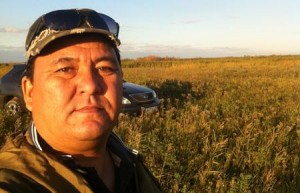 AKMOLA REGION – Head of the company Sarkrama 2006 Kanat Adilbekov has decided to establish a pond fish farm near Astana.
AKMOLA REGION – Head of the company Sarkrama 2006 Kanat Adilbekov has decided to establish a pond fish farm near Astana.
Kazakhstan is rich in fishable waters and therefore, is home to favourable conditions for intensive fish farming. There are 48,000 lakes in the country, 45,000 of which are less than one square kilometre in area. The lakes are unevenly dispersed across the country and are often separated from each other by hundreds of kilometres. But sometimes, they are located so closely to one another that they form a lake region. For example, in the North Kazakhstan region, there are more than 22,000 of these reservoirs. Many of them are rich in freshwater fish, namely carp and perch.
According to Adilbekov, there are more than 4,000 reservoirs and ponds larger than 10,000 square kilometres in the country. They have accumulated a 90-cubic-kilometre volume of fresh water. But most reservoirs are in the central, southern and eastern Kazakhstan regions. People in the capital are deprived of the opportunity to fish.
“Fishermen usually have to travel 100-200 kilometres for a real fishing experience. Fishing is unfortunately expensive for many. Those who cannot afford it head to the Yessil River and make do with small fish, such as bream and perch. With luck, one can sometimes manage to catch a stray carp. That’s why our company decided to open a pond fish farm in the rural Karaotkel district near the capital,” he said.
“The authorities of the Tselinograd District have already put their support behind our project. This novelty is part of an old and long forgotten business. The problem is that the fisheries on the Nura River opened in the 1960s, 70s and 80s. We are grateful to the Tselinograd District business department for their help in the pond fish and agriculture organisation project. The programme was drafted on April, 20 2013 in accordance with Kazakhstan’s rules for fishery management, the technical regulations, as well as all sanitary rules and regulations,” he added.
The new farm uses the most modern technologies available and adheres to the most up-to-date standards. It should be mentioned that the construction of a pond farm on marshlands is not an inexpensive undertaking.
“About 6,000,000 tenge (US$33,000) of private funds were spent on the project’s preparation alone. We need another 120,000,000 tenge (US$660,000) for its completion. The Damu Entrepreneurship Development Fund is ready to provide us with the needed funds. The project is expected to be completed by 2022. We plan to breed freshwater fish, such as grass carp, perch and silver carp in the beginning,” said Adilbekov.
Fish farms need experienced professionals, workers, a strong fishing service, an operational staff and security guards. The project hopes to create 100 jobs.
“Moreover, we plan to open a holiday retreat on our farm complete with wooden cottages and a full range of services for year-round recreation and fishing at a reasonable price. We would also like to hold equestrian events and grow vegetables and garden plants. I believe that fish farms must be profitable. I am confident that in a year or two, our dream will start becoming a reality,” Adilbekov said.
